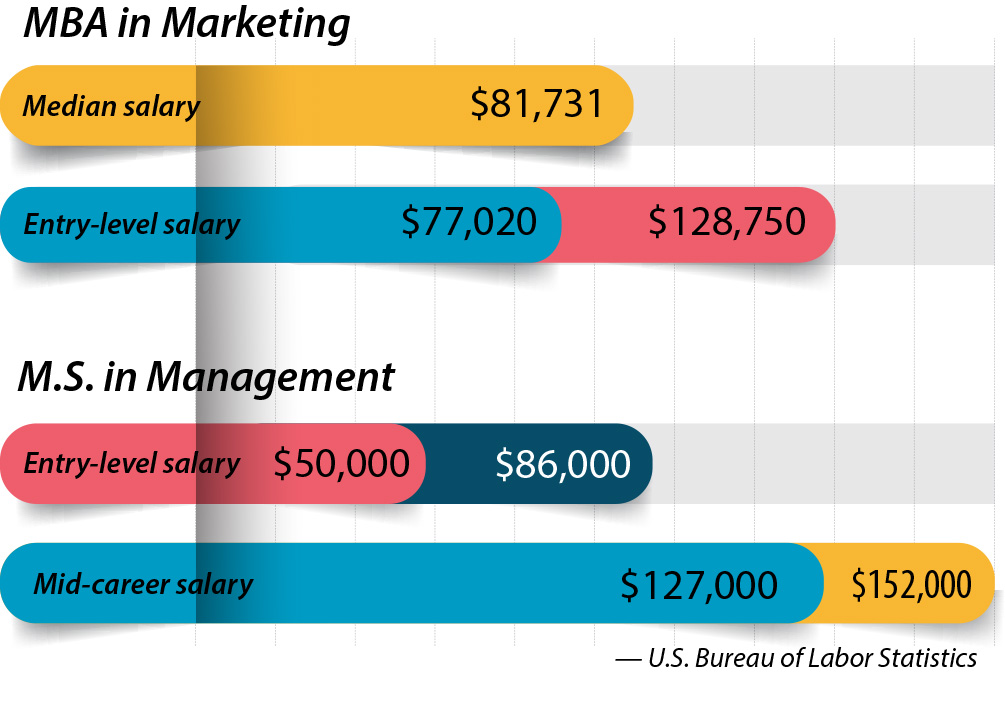
MBA or MS: Which One is Right for You?
Education and Skills in Today's Workforce | Seasoned vs. Entry-Level |
Breadth vs. Depth | Comparing Curriculum
MBA OR M.S.: Which Is Right For You?
You’ve attained your bachelor’s degree and now you want to take the next step in your education and set yourself up for career success. It used to be a clear path: get your MBA. It was the gold standard and oftentimes the only choice if you wanted to move into management and executive-level positions. However, in recent years another option has emerged that can provide you with master’s-level credentials and field-specific knowledge: a specialized master of science (M.S.) in management.
An MBA or specialized master’s degree in management will both provide you with the in-depth knowledge and skills necessary to manage projects, teams, finances and administration.
How do you decide which degree to pursue? Some of the decisions are based on where you are in your career and where you want to go.
Education and Skills in Today’s Workforce
To be successful in today’s workforce, you must not only have knowledge within your field of expertise, you must also have the skills to manage multiple facets of the departments in which you work and lead the people on your team. Judgment/decision making, communication, analysis and administration are the four most in-demand competencies in the labor market, all of which can fully develop in an MBA or M.S. in management degree program.
An MBA degree opens the door to a variety of careers in the fields of business, finance, management and marketing. MBA holders also see an increase in salary versus those with a bachelor’s degree.
According to the U.S. Bureau of Labor Statistics, the median salary for those with a MBA in marketing is $81,731. Entry-level salaries for MBA degree holders typically range between $77,020 and $128,750. For M.S. in management degree holders, entry-level salaries are between $50,000 and $86,000. Mid-career salaries can be between $127,000 and $152,000.

However, as MBAs become more ubiquitous, specialized master’s degrees provide a competitive edge during the hiring process and are steadily gaining in popularity, with increased program enrollments.

“The more well-rounded an individual is, probably the more expensive they are. If you bring a good skill set and multiple disciplines, you probably can command a higher salary.”
—Chad Oakley President of the executive search firm Charles Aris, Inc.
Seasoned vs. Entry-Level
MBA degrees usually are attained by those with three to eight years of professional work experience. The average age of MBA students is between 25 and 32 years. Having a history of work experience helps MBA candidates to integrate their accumulated knowledge into the curriculum and relate to real-world scenarios. They can also integrate their course work knowledge into day-to-day operations at their place of business.

“MBAs are no longer rare and as such are no longer a guarantee for employment.”
— Debbie Goodman, a headhunter for Jack Hammer
M.S. degrees are often sought out by recent college graduates with one to three years of work experience and who are between the ages of 21 and 25. Professional experience thus far does not have to play a major role. With limited work history, the M.S. in management degree can help to kickstart your career by building a foundation of specific knowledge and skills in different areas of management. It could also lead your career in a different direction, as what you learn can give you clarity in what you truly want to pursue.
The average age of MBA students is between 25 & 32 years
The average age of M.S. students is between 21 & 35 years

Breadth vs. Depth
MBA or M.S. in management? Both are master’s degrees and will provide you with greater knowledge and expertise. Both demonstrate the attainment of proficiencies and commitment to additional education that can help to leverage your career.
It may help to decide by asking yourself, “Do I want to improve several functional areas of an organization or do I want to be my company’s go-to person for a specific function?” The answer can help steer you into a program that will realize the future you envision.
The differences in the two can best be described as breadth vs. depth. An MBA provides a well-rounded, advanced education in how businesses are run; an M.S. homes in on advanced-level knowledge about specific areas and functions within a business.
Those enrolled in M.S. programs are honing their skills in particular areas of study and will graduate with knowledge and skills they can put to work immediately. With a specialized master’s degree, you can pursue employment that aligns with specific field and career goals. You’ll view business in terms of functional background, see the value of the role you have as part of that business, and can become your company’s leader and expert in a specific area.
Outside Insights vs. Insider Perspectives
 The MBA offers practical problem-solving skills. Utilizing case studies, MBA students work together to resolve real-world business challenges. Classes are composed of individuals with diverse industry and field backgrounds, as well as levels of experience. This collective provides for diverse insights that may not be as pronounced in a homogenous group, giving students the opportunity to view situations and ideas from the varied perspectives of others.
The MBA offers practical problem-solving skills. Utilizing case studies, MBA students work together to resolve real-world business challenges. Classes are composed of individuals with diverse industry and field backgrounds, as well as levels of experience. This collective provides for diverse insights that may not be as pronounced in a homogenous group, giving students the opportunity to view situations and ideas from the varied perspectives of others.
 Unlike the diversity of MBA student compositions, classmates in M.S. programs are united in their specific interests and will likely build a professional network in which they achieve individual success through mutual support, mentoring and thought leadership.
Unlike the diversity of MBA student compositions, classmates in M.S. programs are united in their specific interests and will likely build a professional network in which they achieve individual success through mutual support, mentoring and thought leadership.
Comparing the MBA vs MS Management Curriculum
Typically, an MBA degree can be completed in two years or less and requires completion of a common set of six core courses including the capstone course in strategic management and an additional two directed electives chosen with the approval of a faculty advisor. These required courses are designed to prepare you to respond to the complex business decisions that arise in today’s rapidly changing environment. As such, these courses incorporate either case studies or projects that require extensive qualitative and/or quantitative analysis.
 THE MBA CURRICULUM INCLUDES:
THE MBA CURRICULUM INCLUDES:
- Essentials of Business Development 1 and 2
- Managerial Economics
- Managerial Accounting
- Financial Management
- Organizational Behavior
- Marketing Management
- Strategic Management
- Four directed electives
M.S. in management degrees also can be attained in less than two years. Whereas an MBA is based on instilling broad practical and functional knowledge you can immediately apply in your career, the M.S. in management provides a deeper dive into specialty areas of business.
M.S. students take several quantitative and analytical courses, with case studies, lectures and class projects that address the theoretical fundamentals of business and their practical applications. Upon graduation, you will have equipped yourself with relevant skills that the job market desires and put your career on a fast track.
THE CORE M.S. IN MANAGEMENT CURRICULUM IS BUILT ON MORE FOCUSED AREAS OF STUDY. THEY INCLUDE:
- Financial accounting
- Corporate finance
- Management theory and thought
- Organizational behavior
- Organizational planning and development
- Applied management project
- Human resources management
- Leadership theory and effective management
- Organizational communication
- Three specialized electives


 Give to Florida Tech
Give to Florida Tech